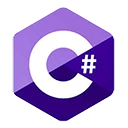Welcome to our comprehensive guide to understanding the fundamentals of C# programming. In this tutorial, we'll walk you through the core concepts and syntax of C#, making it an excellent starting point for both novice and experienced programmers.
What is C#?
C# is a modern, object-oriented programming language developed by Microsoft. It is widely used for developing Windows applications, web applications, and games. C# is a part of the .NET framework, offering a robust platform for software development.
Getting Started
To begin your C# programming journey, you'll need to set up your development environment. Download and install Visual Studio, a popular integrated development environment (IDE) for C# development.
Hello World in C#
Let's start with the traditional "Hello World" example in C#. Open Visual Studio and create a new C# console application:
File > New > Project > Console App (.NET Core)Once your project is created, open the Program.cs file and add the following code:
using System;
class Program
{
static void Main()
{
Console.WriteLine("Hello, World!");
}
}
Now, press F5 to build and run your application. You'll see "Hello, World!" displayed in the console.
Basic C# Concepts
Next, let's explore some fundamental C# concepts:
- Variables: Variables store data. In C#, you declare them with a data type (e.g.,
int,string) and a name. - Control Structures: C# provides various control structures like
if,for, andwhileto manage program flow. - Methods: Methods are reusable blocks of code. The
Mainmethod is an example. - Classes: C# is an object-oriented language, so you'll work with classes to structure your code.
Learn More
Now that you've covered the basics, you can continue your C# learning journey by exploring these resources:
Conclusion
C# is a versatile and powerful programming language with a wide range of applications. This guide has provided you with a solid foundation in C# basics, and you're now well-equipped to dive deeper into the world of C# programming. Happy coding!

